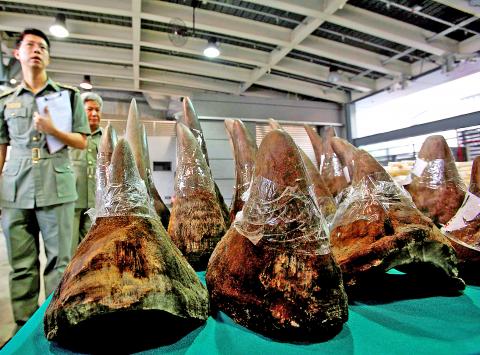China yesterday defended its controversial decision to ease a 25-year ban on trading tiger bones and rhinoceros horns after conservationists warned that the government had effectively signed a “death warrant” for the endangered species.
The Chinese State Council on Monday unexpectedly announced that it would allow the sale of rhino and tiger products under “special circumstances.”
Those include scientific research, sales of cultural relics and “medical research or in healing.”

Photo: Reuters
Previous regulations on rhino horn and tiger bone products did not consider the “reasonable needs of reality,” such as those from scientific research, education and medical treatment, Chinese Ministry of Foreign Affairs spokesman Lu Kang (陸慷) said at a press briefing.
China has also improved its “law enforcement mechanism” and plans to step up efforts to crack down on illegal wildlife trade, Lu added.
Beijing prohibited the trade of rhino horn and tiger bones in 1993, but a black market has flourished, with many products entering the country through Vietnam, according to an investigation conducted last year by the Elephant Action League conservation group.
Wildlife campaigners fear that the new rules could fuel the illegal trade and further put the animals at risk of being poached.
“With this announcement, the Chinese government has signed a death warrant for imperilled rhinos and tigers in the wild who already face myriad threats to their survival,” Iris Ho (何燕青), senior wildlife program specialist at Humane Society International, said in a statement.
However, the State Council said the trade volume would be “strictly controlled”, with any sale outside of authorized use to remain banned.
The newly sanctioned areas of trade would also be highly regulated. Only doctors at hospitals recognized by the State Administration of Traditional Chinese Medicine would be allowed to use powdered forms of rhino horn and tiger bones.
Tourism and cultural heritage authorities would also have to approve any rhino and tiger products that are used for “temporary cultural exchange.”
Despite a lack of scientific evidence, demand for rhino horn and tiger bone is partly driven by their supposed health benefits, from curing cancer to boosting virility.
For rhino horn and tiger bone used for medical research or treatment, the council said only farmed rhinos and tigers can be used, excluding those raised in zoos.
However, activists were not reassured by the regulations.
Farmed wildlife are “born into a miserable life of suffering and then killed for use in medicinal products. It’s a total outrage,” said Kate Nustedt, a program director at non-profit World Animal Protection.

CARROT AND STICK: While unrelenting in its military threats, China attracted nearly 40,000 Taiwanese to over 400 business events last year Nearly 40,000 Taiwanese last year joined industry events in China, such as conferences and trade fairs, supported by the Chinese government, a study showed yesterday, as Beijing ramps up a charm offensive toward Taipei alongside military pressure. China has long taken a carrot-and-stick approach to Taiwan, threatening it with the prospect of military action while reaching out to those it believes are amenable to Beijing’s point of view. Taiwanese security officials are wary of what they see as Beijing’s influence campaigns to sway public opinion after Taipei and Beijing gradually resumed travel links halted by the COVID-19 pandemic, but the scale of

TRADE: A mandatory declaration of origin for manufactured goods bound for the US is to take effect on May 7 to block China from exploiting Taiwan’s trade channels All products manufactured in Taiwan and exported to the US must include a signed declaration of origin starting on May 7, the Bureau of Foreign Trade announced yesterday. US President Donald Trump on April 2 imposed a 32 percent tariff on imports from Taiwan, but one week later announced a 90-day pause on its implementation. However, a universal 10 percent tariff was immediately applied to most imports from around the world. On April 12, the Trump administration further exempted computers, smartphones and semiconductors from the new tariffs. In response, President William Lai’s (賴清德) administration has introduced a series of countermeasures to support affected

Pope Francis is be laid to rest on Saturday after lying in state for three days in St Peter’s Basilica, where the faithful are expected to flock to pay their respects to history’s first Latin American pontiff. The cardinals met yesterday in the Vatican’s synod hall to chart the next steps before a conclave begins to choose Francis’ successor, as condolences poured in from around the world. According to current norms, the conclave must begin between May 5 and 10. The cardinals set the funeral for Saturday at 10am in St Peter’s Square, to be celebrated by the dean of the College

CROSS-STRAIT: The vast majority of Taiwanese support maintaining the ‘status quo,’ while concern is rising about Beijing’s influence operations More than eight out of 10 Taiwanese reject Beijing’s “one country, two systems” framework for cross-strait relations, according to a survey released by the Mainland Affairs Council (MAC) on Thursday. The MAC’s latest quarterly survey found that 84.4 percent of respondents opposed Beijing’s “one country, two systems” formula for handling cross-strait relations — a figure consistent with past polling. Over the past three years, opposition to the framework has remained high, ranging from a low of 83.6 percent in April 2023 to a peak of 89.6 percent in April last year. In the most recent poll, 82.5 percent also rejected China’s